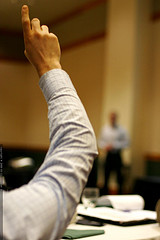Apr 9, 2009 Comments Off on I’ll Ask the Questions Here
I’ll Ask the Questions Here
This was one of my first posts on Aquent’s Talent Blog, November 3, 2006
What if you went into a job interview and asked all the questions?
 The web is rife with tips on how to interview successfully. You can find them here and here and here. For the contrarians among you, there are even tips on interviewing unsuccessfully.
The web is rife with tips on how to interview successfully. You can find them here and here and here. For the contrarians among you, there are even tips on interviewing unsuccessfully.
The tipsters all emphasize being prepared, which is unassailably sound advice, as any Boy Scout would tell you, but they don’t point out something that might make you rethink your entire approach to interviewing: Interviewers are often unprepared!
While some companies have thoroughly developed and well-defined processes for interviewing people (and will even provide you with a detailed overview of said processes beforehand), many companies do not. In fact, as these tips for interviewers from Monster imply, the interviewing process subjects interviewers themselves to a lot of stress.
So what does this mean to you as a marketing professional approaching an upcoming interview? It should encourage you to play an active role in the interview and work hard to make it a conversation rather than an interrogation. Don’t be afraid to take the lead and start off by asking questions, especially thoughtful, well-crafted questions that demonstrate your knowledge and experience while simultaneously conveying your interest in the position. As a kind of test, ask yourself, Could I get a job offer based solely on these questions I’m asking?
Asking questions, especially from the outset, will take some pressure off the interviewer and, ideally, provide you with insights that will allow you to present your own qualifications in the context of the role. This is key, for while the interviewer will inevitably ask you what you have done for others, she is most interested in discovering what you will do for her, her team, and her organization. There is no better way to do that then by peppering any discussion of your talents and triumphs with specific references to the challenges she is currently facing.
Ultimately, by engaging in a conversation about the role rather than submitting to an interview for it, you will accomplish two things. First, you will more readily be seen as a colleague or a peer than a candidate. In a sense, you will already have entered the interviewer’s world.
Secondly, and most importantly, if in this conversation you can project a sincere eagerness to learn and contribute to the success of the enterprise, you will send the message that every interviewer wants to hear: Not only can I do this job, I’m already thinking about how I’m going to get it done. Let’s get started right now!
Image Courtesy of Sean Dreilinger.

